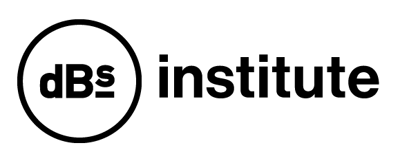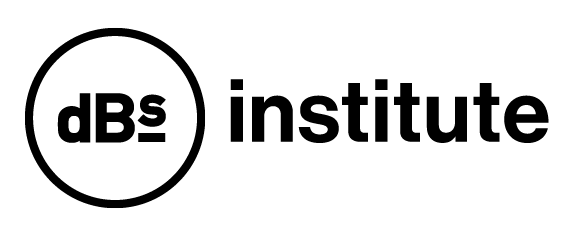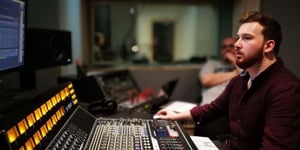During his time at dBs Institute Bristol, Harrison White was a permanent fixture in the studios, working on a multitude of projects and pushing himself creatively. Now making waves in the audio industry we caught up with him to discuss the imminent arrival of his new company, winning the AMS Neve Award and his advice to anyone embarking on an undergraduate degree at dBs.
Tell us a little about your journey into music production, how you first got it making music and what led to where you are now?
I’ve been a keen musician ever since picking up the trumpet and double bass at the age of 7. By the time I was 14 I found myself working in theatre and live music, initially as stage crew, but then moving on to the sound crew where I later found myself heading up the department - it was this that truly ignited my passion for sound engineering. I then decided to follow my newfound passion and ended up studying A Level music technology. The rest, as the cliché saying goes, is history.
How did you find out about dBs Music and why did you choose to study with us?
All it took was a quick Google search. When hunting for a sound engineering course, I knew I wanted it to have an even balance of audio technology, creativity and science (something which very few universities actually offered). After a quick read through of the course overview, and a quick look at the studio pictures, I knew straightaway that the Music Production and Sound Engineering course at dBs Institute was the one for me!
You’ve been very busy since leaving dBs and are in the process of starting a new business. Could you tell us a little about it?
Yes, I’m now in the latter stages of starting up a new creative audio company, Cue Point Audio Ltd., which specialises in, and provides bespoke audio production, audio post-production and composition services and solutions for feature films, short films, commercials, corporate videos, charity videos, and almost anything else in between.
Aside from providing audio services to our clients, our key selling point is that we utilise a large network of freelancing audio professionals which allows us to play ‘matchmaker’ and pair each project with a freelancer who is perfectly suited to the client’s brief.
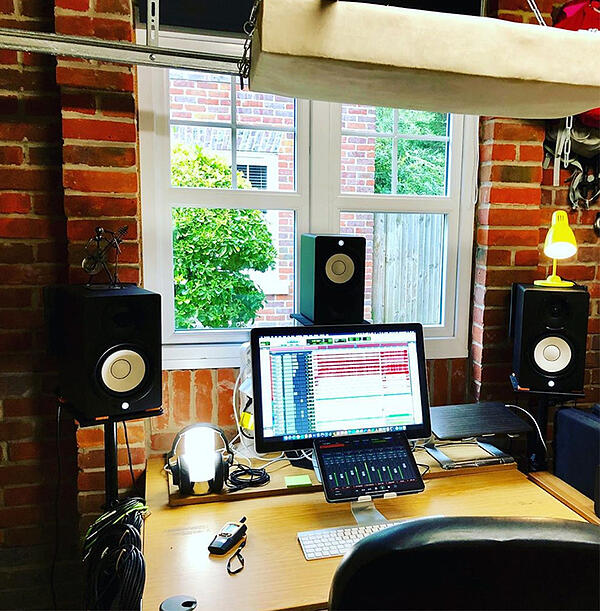 Harrison's home studio
Harrison's home studio
Why? Well, with the internet continually developing, and network speeds ever-increasing, we believe that remote collaborations are the future for audio workflows. Ultimately, we don’t want to be bound in by the walls of our own ‘house’. We want to collaborate. We want to work with outsiders, freelancers and contractors, and we know that there is so much more talent out there, so why not give our clients access to them.
Having already got audio post credits on several shorts, and recording/mixing credits on numerous tracks, my calendar is certainly starting to get booked up with various future projects, including our first feature film, a series of commercials and a corporate video.
During your third year you created one of the standout projects for the Innovation in Production module. Could you explain it for those reading?
Somehow, probably after a beer one evening, I came up with my ‘Around The World in Virtually However Long You Want’ project idea for the Innovation in Production module.
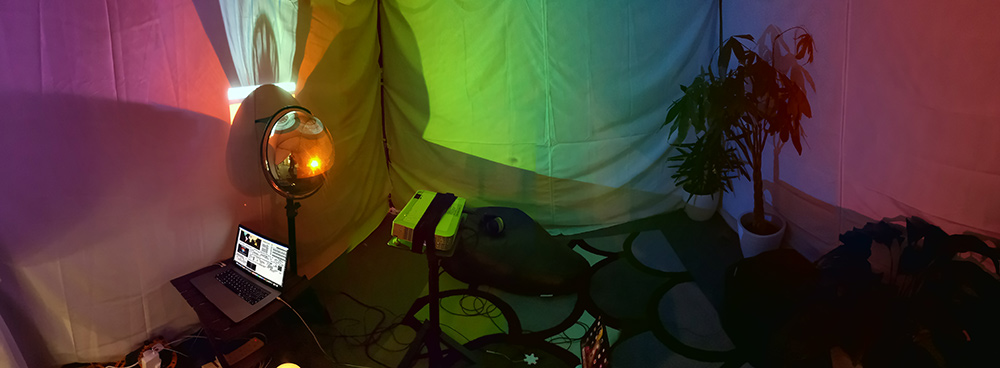
The view inside 'Around The World in Virtually However Long You Want'
The idea was originally sparked from my interest in soundscape composition, field recording and programming software Max. When all this was paired with some interesting research (courtesy of my honours project), and the unintentional discovery of global, live-streaming webcams, I was then able to fully establish my concept and ideas for the project. The concept was as follows:
In today’s technology-filled society, humans are losing touch with nature. Nature has become more of a distant friend compared to a companion and therefore it is vital that humans begin to re-connect with it. As a connectedness with nature is often associated with greater wellbeing and life satisfaction, nature is commonly used within mindfulness practices. Exposure to both visual and auditory naturalistic stimuli, has been scientifically shown to have significant positive concurrent and consequent effects on mood and psychological health. The cause of these effects are widely claimed to be a result of the ‘biophilia hypothesis’ which follows the belief that humans manifest a natural tendency to seek out connections with nature.
‘Around the World in Virtually However Long You Want’ was a real-time, interactive nature soundscape installation which explored this concept of mindfulness through human interconnection with nature. The installation aimed to provide listeners with a chance to relax, unwind and meditate through enjoying the real-time sounds of nature as they interactively, and virtually, travelled the world.
What was it like for your creativity to be pushed into such a different direction?
Personally, I loved it! During my whole time at dBs I was pushed in all sorts of directions, learning about different industry areas, and this project just pushed me out that little bit further. It was by far the oddest audio-related thing I have ever done and, as a final year student, I found it invaluable as it allowed me to creatively think outside the box and collaborate with friends, family and field recording professionals from around the world. Best of all, with the nature of the project and sounds used, I was ultimately getting a chance to relax and de-stress myself.
You and dBs graduate Ezra Gray have been involved in a number of short films, with you working as Supervising Sound Editor and Dubbing Mixer. How did you first get started working on those types of projects?
%20Official%20Poster-Dec-15-2022-05-39-08-4191-PM.jpg?width=300&name=Close%20(Short%20Film)%20Official%20Poster-Dec-15-2022-05-39-08-4191-PM.jpg) It was always my ultimate goal to get into audio post-production, although, that said, it did come around about 10 years earlier than planned! I just happened to be in the right place at the right time when I was asked by a film producer friend of mine to do the soundtrack for his short film - of course I jumped at the opportunity!
It was always my ultimate goal to get into audio post-production, although, that said, it did come around about 10 years earlier than planned! I just happened to be in the right place at the right time when I was asked by a film producer friend of mine to do the soundtrack for his short film - of course I jumped at the opportunity!
With the dialogue, sound design, music and final mixdown all needing attention, I decided that I’d need backup so I enlisted the help of Ezra for sound design and Joe Yorke for music composition. These guys were an obvious choice for me. With Ezra’s passion and talent lying in field recording and sound artistry, and Joe’s fantastic ear for composition and music production, I knew that the work was in good hands and it’s safe to say they both did a fantastic job!
With the sound design and music covered, I was then able to oversee the whole audio post process, meet with the producer and directors, and prioritise my time working on the dialogue restoration, sound editing and the final stereo and 5.1 dubbing mix. With that particular film impressing at its London premiere and then gaining nominations for awards at the LA Film Festival, it wasn’t long before more work was coming our way.
Here’s a link to the trailer for that film:
How did you cope with prioritising and managing all these projects?
The trick for me is to not bite off more than I can chew. It all lies in the organisation. When I get asked to work on a project I need to find out what the client’s brief entails and what their timeline is. From this I can then calculate how much time I’d need to set aside to work on it and how many other freelancers I may need to draft in to help.
It’s also key to keep up with the business admin. I always allocate myself some time every day to catch up on my emails, send out fee estimates, write up contracts etc. For myself, as supervising sound editor and dubbing mixer, I tend to only take on one project at a time. That said, with a number of freelancers in my roster that I can call upon, the business itself can take on multiple projects simultaneously - all I then need to do is the admin.
You were presented with the AMS Neve Award at graduation last year. How did it feel to win?
The best part about studying at dBs was the use of the studios - I was in one of them almost every spare moment I had. I never held back when it came to recording sessions - I was always challenging myself!
After spending so much time in the studios I was over the moon to receive the AMS Neve Award at my graduation ceremony. It came as both a great surprise and a great honour, and I was chuffed that my efforts in the studio had been recognised by my lecturers!
I recently decided that I was going to make the most of this award, and so I travelled to Burnley to visit AMS Neve themselves. While there I was able to tour their factory, learn about their manufacturing process, check out some of their vintage gear, demo some of their consoles (particularly the Genesys Black), and also demo some of their outboard gear, including their new AMS RMX16 500 series reverb unit – I guess that’s a perk of visiting them after the winter NAMM showcase!
-4.jpg?width=600&name=Harrison%20White%20Discography%20(Screenshot)-4.jpg)
Harrison's discography of projects
It’s clear you’ve applied yourself to so many facets surrounding the audio industry, from production to entrepreneurial endeavours. How did your time at dBs Music help you reach those goals?
Three key things: the course content, the lecturers and the facilities. From the moment I stepped into my first lecture I was learning loads about the industry and how it operates. The course content was seemingly created to give us students a solid grounding in the different audio industry sectors, and with highly skilled and knowledgeable lecturers teaching us, we all got a thorough insight into recording, mixing, mastering, sound for visual media, music business techniques etc. Of course, all this was made considerably easier by having access to, and working in, the fantastic, industry-standard studios that dBs has available to offer.
Outside of the course, the staff at dBs also helped me a lot with my entrepreneurial endeavours at the time - a mixing/mastering service-based company I formed in my second semester of first year. I found that at dBs I was able to have one-to-one conversations with the staff about my company and, with their knowledge of the industry, they were able to push me in the right direction and offer me help and advice when I needed it.
If you could talk to your pre-uni self, what one piece of advice would you give him?
Hmm... this is a tricky one to answer. I feel as though I couldn’t have squeezed any more out of my time at dBs so, off the top of my head, there aren’t any changes I’d make if I were to do it all again. But, here’s some pointers nonetheless:
- Make the most of it!
- Turn up to lectures.
- Use the facilities and gear as much as you can to start building up your portfolio - once you leave, the chances of you stumbling straight into a commercial recording studio are on the slim side.
- Push yourself to your limits - challenge yourself.
- Think outside the box.
- Ask questions.
- Seek one-to-one help with your lecturers. Whether that be at uni or in the pub next door, you will be surprised by how much more you can learn from this 1-1 time.
- Have fun and enjoy it!
- And most importantly, collaborate with, and help out your peers.
And what advice would you give to anyone looking to work in the audio industry?
Network... and start networking now. This is key! In the audio industry it’s more about who you know as opposed to what you know. I’m a firm believer that no matter how hidden it may be, there is always a smooth route into the job you want to do, you just have to find it - having a good network around you can make this a breeze. I really can’t stress how important I think networking is!
That said, there is one thing more important than networking... being confident, having faith and not giving up! If working in the audio industry is something you really want to do, then you have to pursue it head-on and if something doesn’t quite go your way then don’t give up. Take that pushback, analyse it and make yourself better from it.
What’s next in the pipeline for you?
Well first and foremost I will be focussing on getting my business officially launched in the next month or so. After that, fingers crossed, it should be business as usual. I have a number of audio post projects in the pipeline including, but not limited to, feature films, short films, corporate videos and commercials.
As for audio production work, I will be continuing to work with Bristol-based reggae band Talisman on their new album due to be released very soon (cheeky plug), and also working with up-and-coming singer-songwriter and producer George Wilks on his string of single releases.
Where can people find out more about you and your music?
The obvious place to find more about me and what I do would be on my website (www.cuepointaudio.com). However, it is currently inaccessible as it is locked for the maintenance/rebranding - it should, however, be up-and-running again soon. Otherwise pay my Instagram a visit.
Aside from that here’s some other links to my audio production work:
- EdZilla ft. LazyEyes (mixing and mastering engineer)
- Five Fathoms Deep - Live at dBs Studios Album Sample (recording and mixing engineer, mastered by dBs Graduate Joe Baker)
- Raw 360-degree video of Talisman’s Recorded Rehearsal (in Studio 3):
- An ambient album I produced back in 2017 (producer, mix and master engineer)
FIND OUT MORE
Instagram
YouTube
Spotify
Do you share a similar passion for all things music production? Take a look at our Music Production & Sound Engineering degree.
